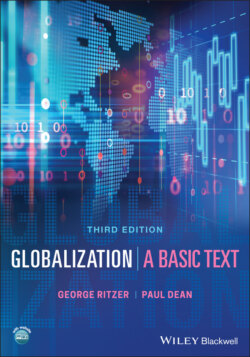Читать книгу Globalization - George Ritzer - Страница 79
COMPARISONS WITH GLOBALIZATION
ОглавлениеWhile there are some signs of de-globalization (see chapter 2), many dimensions of globalization nonetheless continue in the early twenty-first century. Relative to globalization, some of the other processes (colonialism, development) have been superseded in importance and others seem to have passed their prime and to be in decline (Westernization, Americanization). It could be argued that imperialism, or at least the “new imperialism,” has been incorporated into globalization. Given the rise of China as a global power, Easternization, like globalization, is likely to show dramatic growth in the coming years.
Globalization is inherently multidirectional with global flows moving in innumerable directions. It has no single, definable point of geographic origin. All of the others are much more unidirectional, flowing from well-defined points – the imperial powers, the colonial powers, the developed world, the West, the United States, the East.
Globalization is not nation-state based and is likely, as we will see in several places in this book, to pose a threat to the nation-state. All of the other processes tend to be based in one or more nation-states (e.g. Soviet imperialism, British colonialism) and to affect one or more nation-states (e.g. states behind the Iron Curtain, Britain’s former colonies).
Another way of saying much the same thing is that globalization is a decentered process. All of the others have clear centers from which they emanate and extend their power and influence.
Globalization does not generally involve military and direct (e.g. occupation; imposition of administrators as in colonialism) control by some nations over others. There is power, control, even exploitation, but in the main it tends to be accomplished more subtly than imperialism, colonialism, and even development. The other processes – Westernization, Americanization, Easternization – vary greatly in degree of heavy-handedness and directness. Easternization, at least as it is practiced today, is the subtlest of these practices; Westernization and Americanization have often been quite blunt and direct and, in any case, have been closely tied to imperialism, colonialism, and development.
Because it tends not to be as heavy-handed, globalization (and the processes discussed in this chapter) does not lead to the same intense opposition as did imperialism, colonialism, and to a lesser degree development. In the latter cases, opposition often took the form of armed rebellions and wars designed to end them, although those wars were not always successful.
That is not to say that there are not strong negative reactions against globalization (and development, Westernization, Americanization). Indeed, nationalist movements in the US and many other countries, as well as the alter-globalization movement show this to be the case. In these contexts, many large and sometimes violent protests are mounted against it. Americanization, in particular, is also prone to eliciting strong (negative and positive) reactions throughout the globe. But as one recent headline put it, “globalization is moving past the US and its vision of world order” (Goodman 2019).
To the extent that these other processes continue to exist and to be of significance, it could be argued that globalization is the broadest and most all-encompassing process and can be said to include imperialism, Westernization, Americanization, and Easternization.
Colonialism and dependency are of more historical interest as well as being models of what globalization ought not to do and to be like. Unfortunately, globalization often comes to resemble them much too closely.
While this chapter has sought to draw distinctions among various processes and to distinguish them in one way or another from globalization, the fact is that there are strong overlaps among and between them. If we accept the idea that globalization is the latest and the broadest of these processes, it is possible to conclude that all of the others either continue to survive in, or are subsumed under, it. In terms of the former, there are certainly those who see elements of the earlier epochs of imperialism, colonialism, and dependency surviving, if not being alive and well, in the global age and in the process of globalization. This is especially true of those who are critical of the neoliberalism that dominates globalization today (see Chapter 4). They would see globalization as a newer, kinder-sounding label, and a subtler method, for more long-standing efforts to exert imperial control over, to colonize, and to create dependency among, many of the weaker nation-states and other areas (e.g. stateless locales) of the world. Beyond that, it is possible to see the other processes – Westernization, Americanization, and Easternization – as sub-processes within globalization that continue to exist to this day and to argue that one or more of them may even increase in importance in the future. Thus, while it makes sense, as we have throughout this chapter, to draw distinctions among and between these processes, they all can also be seen as informing, and as being part of, globalization. In the end, the key point is that in gaining a better understanding of these processes, we gain a more nuanced and sophisticated sense of the fundamental nature of globalization. This is the case whether we carefully distinguish among these processes or see them all as part of a larger process of globalization.
